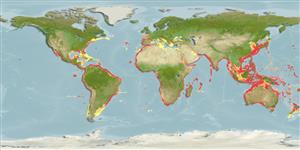Common names from other countries
分类 / Names
俗名 | 同种异名 | Catalog of Fishes(属, 种) | ITIS | CoL | WoRMS | Cloffa
Teleostei >
Scombriformes (Mackerels) >
Trichiuridae (Cutlassfishes) > Trichiurinae
Etymology: Trichiurus: Greek, thrix = hair + Greek, oura = tail (Ref. 45335); lepturus: Specific name from Greek 'lepturus', for its thin or slender tail..
More on author: Linnaeus.
Environment: milieu / climate zone / depth range / distribution range
生态学
海洋; 半咸淡水 底中水层性; 非产卵性溯降河的 (Ref. 51243); 深度上下限 0 - 589 m (Ref. 58018), usually 100 - 350 m (Ref. 35388). 亞熱帶的; 49°N - 54°S, 114°W - 180°E (Ref. 54931)
Circumtropical and warm temperate seas; including Gulf of Mexico, Caribbean Sea, Mediterranean Sea, Sea of Marmara, Red Sea, Persian Gulf.
在熱帶與世界的溫帶水域各處。 在日本描述為本來的 白帶魚〔Trichiurus lepturus〕 japonicus 的 日本帶魚〔Trichiurus japonicus〕 與 白帶魚〔Trichiurus lepturus〕 同種異名。 另一個分類的魚種與 白帶魚〔Trichiurus lepturus〕 同種異名是來自東太平洋海洋 (加州到祕魯) 的 太平洋帶魚〔Trichiurus nitens〕 。
Length at first maturity / 大小 / 重量 / 年龄
Maturity: Lm 50.6, range 30 - 99 cm
Max length : 234 cm TL 雄鱼/尚未辨别雌雄; (Ref. 26340); common length : 100.0 cm TL 雄鱼/尚未辨别雌雄; (Ref. 26999); 最大体重: 5.0 kg (Ref. )
背棘 (总数) : 3; 背的软条 (总数) : 130 - 135; 臀鳍软条: 100 - 105. Body extremely elongate, compressed and tapering to a point. Mouth large with a dermal process at the tip of each jaw. Dorsal fin relatively high; anal fin reduced to minute spinules usually embedded in the skin or slightly breaking through; anterior margin of pectoral fin spine not serrated. Pelvic and caudal fins absent. Lateral line beginning at the upper margin of the gill cover, running oblique to behind the tip of the pectoral fins, then straight close to the ventral contour. Fresh specimens steely blue with silvery reflections, becoming uniformly silvery gray sometime after death (Ref. 6181).
身体非常细长, 扁长形的而且渐渐变细成一个尖点。 在每个颌的顶端嘴巴大的,有一个表皮的突起。 背鳍相当高的; 臀鳍缩小成通常被插入皮肤或些微地突破的细小的小刺了; 胸鳍棘的前缘不锯齿状的。 腹鳍与尾鳍不存在。 侧线开始在鳃盖的上缘, 斜向延伸到胸鳍的顶端后面, 然后笔直地接近腹的轮廓。 新鲜的标本铁蓝色的有银色的反光, 在死亡之后某一个时间变成均匀银灰色.(参考文献 6181)
Generally over muddy bottoms of shallow coastal waters (Ref. 9351). Often enter estuaries (Ref. 9351). Juveniles feed mostly on euphausiids, small pelagic planktonic crustaceans and small fishes; adults feed mainly on fishes and occasionally on squids and crustaceans (Ref. 6181). Adults and juveniles have opposing complementary vertical diurnal feeding migration. Large adults usually feed near the surface during the daytime and migrate to the bottom at night. Juveniles and small adults form schools 100 m above the bottom during the daytime and form loose feeding aggregations at night near the surface. Pelagic eggs (Ref. 35388) and larvae (Ref. 6768). Max weight of 1.5 kg given in Ref. 28023 seems too low. The current angling world record was caught in Rio de Janeiro's Guanabara Bay and weighed 3.69 kg. Commercial fisherman have caught fish of up to 5 kg (Capt. Eduardo Baumeier, pers. Comm., 2001). Marketed salted or dried and also frozen (Ref. 9351). Excellent taste when fried or grilled; also for sashimi when fresh.
通常沿岸浅水区在泥沙底上面。 (参考文献 9351) 时常进入河口。 (参考文献 9351) 稚鱼大部分吃磷虾,小型大洋性鱼类浮游生物甲壳动物与小鱼; 成鱼主要捕食鱼与偶然地吃乌贼与甲壳动物.(参考文献 6181) 成鱼与稚鱼有相对垂直日行性觅食回游。 大的成鱼通常在白天的时候吃接近水表面而且回游到底部在晚上。 稚鱼与小的成鱼在白天的时候形成鱼群 100 公尺上方底部而且形成松散的摄食群集在晚上接近水表面。 在市场上销售盐腌或乾燥而冷冻的.(参考文献 9351) 优良的品尝何时油炸或烧烤; 也新鲜时用作生鱼片。 大洋性的卵.(参考文献 35388) 最大体重为 1.5 公斤记录在参考文献 28023 似乎太低。 现在的垂钓世界记录于里约热内卢的 Guanabara 海湾与重量为 3.69个公斤捕获商业的渔夫已经捕捉向上到的鱼 5 公斤 (Capt. Eduardo Baumeier , pers. comm。,2001)。
在熱帶與世界的溫帶水域各處。 在日本描述為本來的 白帶魚〔Trichiurus lepturus〕 japonicus 的 日本帶魚〔Trichiurus japonicus〕 與 白帶魚〔Trichiurus lepturus〕 同種異名。 另一個分類的魚種與 白帶魚〔Trichiurus lepturus〕 同種異名是來自東太平洋海洋 (加州到祕魯) 的 太平洋帶魚〔Trichiurus nitens〕 。
Nakamura, I. and N.V. Parin, 1993. FAO Species Catalogue. Vol. 15. Snake mackerels and cutlassfishes of the world (families Gempylidae and Trichiuridae). An annotated and illustrated catalogue of the snake mackerels, snoeks, escolars, gemfishes, sackfishes, domine, oilfish, cutlassfishes,. scabbardfishes, hairtails, and frostfishes known to date. FAO Fish. Synop. 125(15):136 p. (Ref. 6181)
CITES (Ref. 128078)
Not Evaluated
人类利用
渔业: 高经济性; 游钓鱼种: 是的
工具
特别资料
下载 XML
网络资源
Estimates based on models
Preferred temperature (Ref.
115969): 10.1 - 23.2, mean 15.2 (based on 1178 cells).
Phylogenetic diversity index (Ref.
82804): PD
50 = 0.5020 [Uniqueness, from 0.5 = low to 2.0 = high].
Bayesian length-weight: a=0.00035 (0.00029 - 0.00042), b=3.15 (3.10 - 3.20), in cm Total Length, based on LWR estimates for this species (Ref.
93245).
营养阶层 (Ref.
69278): 4.4 ±0.4 se; based on diet studies.
回复力 (Ref.
120179): 中等的, 族群倍增时间最少 1.4 - 4.4年 (K=0.25-0.29; tm=2-3.7; tmax=15; Fec=21,672).
Prior r = 0.21, 95% CL = 0.14 - 0.32, Based on 3 full stock assessments.
Fishing Vulnerability (Ref.
59153): Moderate to high vulnerability (52 of 100).
Climate Vulnerability (Ref.
125649): High vulnerability (62 of 100).
